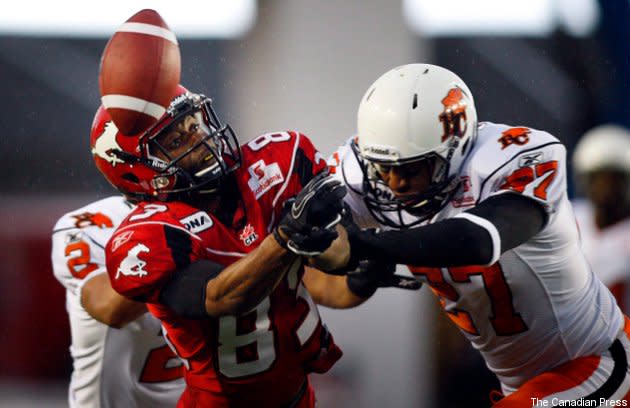Aboriginal players Levi Horn and J.R. LaRose could make B.C. a unique pro team
CFL players come in fromall sorts of backgrounds, and that often makes for an interesting mix in training camps between Canadians, Americans, rookies trying to figure out this league and established veterans who know how Canadian football works. Players often form connections beyond just their status, though, as they often come from the same areas or have played with or against teammates in the NCAA or CIS ranks. Sometimes, the connections are even more interesting than that, and that's the case with B.C. Lions' offensive line prospect Levi Horn and safety J.R. LaRose. As Lowell Ullrich writes, the two have a partly-shared heritage, and one that could make the Lions an anomaly in pro sports if both make the roster:
Horn is a registered member of a branch of the Cheyenne tribe, and so much wants to make the roster of the CFL team so he can keep giving back. Not just for a wife and child back home in Missoula, Mont., but for the native Americans who see him as a hero simply for what he has already accomplished. ...
That Horn might be able to make a difference, playing as a backup offensive lineman for the Lions alongside Cree safety J.R. LaRose, on what would be the only pro team in North America currently with two native roster players, would be nothing short of historic.
"I've got a lot of people cheering for me," Horn said.
The two players connected almost immediately at the start of Lions training camp. If anyone could relate to the rookie, even one who is 6-7 and 330 pounds, it was LaRose, whose father was deported at an early age. He was raised by a single mother on welfare in a family where drug addiction was widespread.
Football was the only father figure to Horn, whose mother raised three children on her own while battling lupus since she was in high school. Weighing nearly 12 pounds at birth, the game was a natural draw, except for the fact he couldn't afford proper equipment. A 6-4, 240-pounder in grade eight, he started by playing basketball because his high school coach bought him a pair of sneakers.
Both Horn and LaRose have gone through some tough times, but both have shown they've got the capability to play football at a high level. LaRose came into the league following an impressive junior career with the Edmonton Huskies. He's spent eight seasons in the CFL and suffered innumerable injuries along the way, but he finally has an excellent chance to win a starting job thanks to Cauchy Muamba's departure for Winnipeg. Meanwhile, Horn started off as a tight end at the University of Oregon, then switched to offensive line. He transferred to Montana and starred on the line there, and he's since spent two years with the NFL's Chicago Bears, plus a stint with the Minnesota Vikings and a brief time with the Arena Football League's Spokane Shock. Both certainly could have the potential to make the Lions' roster, although LaRose obviously will have an easier time of it given his CFL experience and his non-import status.
Horn and LaRose may have an interesting opportunity to shine a light on aboriginal issues, too, and they could provide a reminder that many of those issues are far from settled. Assembly of First Nations national chief Shawn Atleo told Postmedia News' Michael Woods that "Progress, where we can see it, feels way too slow" in a story published Monday, five years after prime minister Stephen Harper officially apologized for the residential school system that was active in Canada until the mid-20th century. In advance of June 21's National Aboriginal Day, UBC journalism professor and CBC reporter Duncan McCuerecently wrote about how aboriginal people are underrepresented in both journalism as a profession and as interviewees of journalists. There are a lot of notable aboriginal stories out there, and one particularly interesting one centres around the continued existence of the NFL's Washington Redskins (a story that's also touched Canada: Atleo and others have called for the youth football Nepean Redskins to change their name, but that hasn't happened yet). When Ullrich asked Horn about the Washington situation (which has recently seen members of the U.S. Congress lobbying team owner Daniel Snyder to change the name), he received a notable response:
"Just because racism is normalized to us it doesn't make it right. Redskins is a racist, offensive word. If you called me a redskin right now, we're done. Why name a team that way?"
There's a different perspective than what you see in most CFL player interviews, and that speaks to what might be so special if both LaRose and Horn make this team. They'll succeed or fail based on their skill, of course, and that's how it should be. If the Lions do become the first North American pro team to have two aboriginal players on their roster at the same time, though, that's a unique situation, and one that should be celebrated; it's also one that might shine a brighter light onto ongoing aboriginal issues. Both Horn and LaRose work to help aboriginal kids (LaRose speaks to children on reserves across Western Canada during the offseason, while Horn has been involved in everything from presidential fitness initiatives to diabetes awareness and research), and Horn told Ullrich he and LaRose can be inspirations to others from aboriginal backgrounds:
"I feel like me, (LaRose), this generation and the friends I know, it's time to turn it around and we're the people to do it. This generation needs to bring up our youth and show them it can be done," Horn said.
"Think of the big picture: That's what the native thinking needs to be. Go out, but come back and help. Don't go out and get lost (in society). Get your bleep together. It's hard work and we got to do it."

 Yahoo Sports
Yahoo Sports 



